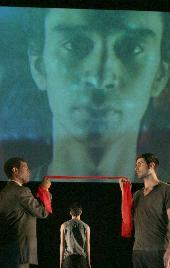SITE GUIDE
SEARCH
REVIEWS
REVIEW ARCHIVES
ADVERTISING AT CURTAINUP
FEATURES
NEWS
Etcetera and
Short Term Listings
LISTINGS
Broadway
Off-Broadway
NYC Restaurants
BOOKS and CDs
OTHER PLACES
Berkshires
London
California
New Jersey
DC
Philadelphia
Elsewhere
QUOTES
TKTS
PLAYWRIGHTS' ALBUMS
LETTERS TO EDITOR
FILM
LINKS
MISCELLANEOUS
Free Updates
Masthead
Writing for Us
A CurtainUp Review
Philoktetes

Will Badgett (as Odysseus); Jason Lew (as Neoptolemus); and Louis Cancelmi (as Philoktetes).
(Photo: Paula Court) |
Philoctetes was part of the Greek army assembled by Odysseus. Somehow, in the course of the sea journey to fight the Trojan War he was wounded. Accounts vary. Some have him bitten by a snake and, when his wound festered and turned putrid, left by his shipmates on an island with Heracles' bow and arrows to keep him company. There he remained alone for ten years, alone and with the wound never healing. As the Trojan War waned, King Priam's son revealed under torture that the Greeks could only win the war with Heracles' bow and arrows and so Odysseus returned to the island to retrieve Philoctetes and his armory — and to try and convince him to suffer further for his country.
In the original version, Philoctetes goes with Odysseus, his wound is healed, he slays many Trojans, and he returns to Italy triumphant. In Jesurun's version, Philoctetes is a broken man, but a brutal one, unwilling to suffer for ideals. He knows the Greeks need him and he enjoys toying with them and punishing them for their cruel treatment of him. And that's as much of the story as we ever get.
This Philoktetes is more an exercise in lush visual projections and lyrical, though occasionally startling, language than it is in reviving ancient Greek myths. Philoktetes, Odysseus and Neoptolemus, Odysseus' companion, have a series of short scenes in which they take turns trying to gain verbal dominance. Sometimes they succeed, sometimes they don't. Their struggle highlights the essential personality traits of each character: Philoctetes is caustic and brooding, Odysseus desperate but unwilling to appear so, Neoptolemus simply impatient and ready to get back to the fighting.
The play could easily be a treatise on the nature of suffering and pain or an analogy to the war in Iraq and our collective unwillingness to fight in it; or it could simply be the story of a lonely and disfigured man. Here it is none of the above. The centerpiece of the production is Jesurun's strangely beautiful language. Short, terse, blended with blunt vernacular, the innate poetry is complemented by a series of lush visual projections. Soho Rep's tiny stage is graced by two flat panels which bear the mirrored projections, and almost nothing else. The rest of the scenery consists of three chairs.
It's an oddly intoxicating show. While there is almost nothing in the way of plot, or character development, and with only a few traces of the original Greek myth left to guide us (principally in the characters' names), the aural and visual stimulation offset the relative barrenness of the story line. Louis Cancelmi as Philoktetes is the moral center (or, perhaps, the amoral center) of the play. He wears his bitterness like a crown, almost as a badge of honor. Odysseus and Neoptolemus batter themselves against him, but Philoktetes' suffering has ruined him as a human being and he knows it. Cancelmi's stoic performance highlights his (now self-imposed) isolation from the rest of humanity.
Jesurun's direction and unique design keep the audience's attention focusedon the language and the projections. That's exactly as it should be in this u nique production, of a story that's very rarely told.
|
Philoktetes Written, directed and designed by John Jesurun With Will Badgett, Louis Cancelmi and Jason Lew Costume Design: Ruth Pongstaphone Lighting Design: Jeff Nash Running Time: Seventy minutes, no intermission Soho Rep, 46 Walker Street; 212-868-4444 From 10/13/07; opening 10/17/07; closing 10/28/07 . Tuesday through Sunday at 7:30 pm Tickets $0.99 for all Sunday performances, $25 for all other performances Reviewed by Jenny Sandman based on October 17th performance |
Try onlineseats.com for great seats to
Wicked
Jersey Boys
The Little Mermaid
Lion King
Shrek The Musical

The Playbill Broadway YearBook

Leonard Maltin's 2007 Movie Guide


Wicked
Jersey Boys
The Little Mermaid
Lion King
Shrek The Musical

The Playbill Broadway YearBook

Leonard Maltin's 2007 Movie Guide


